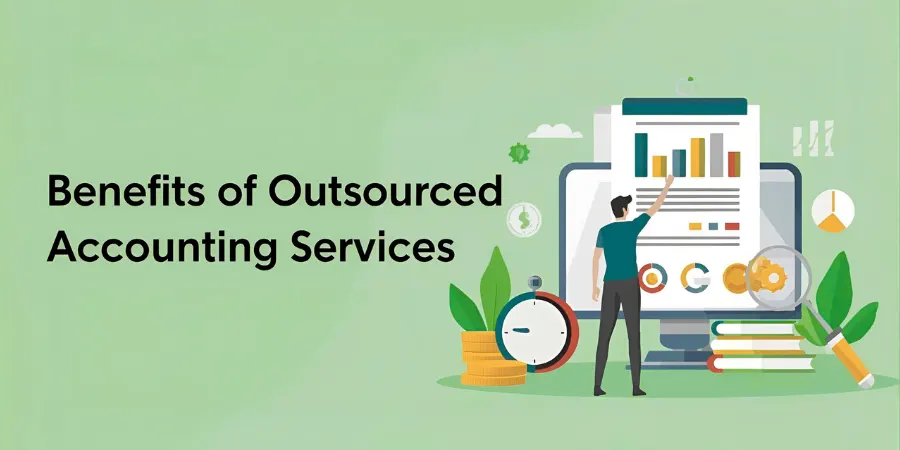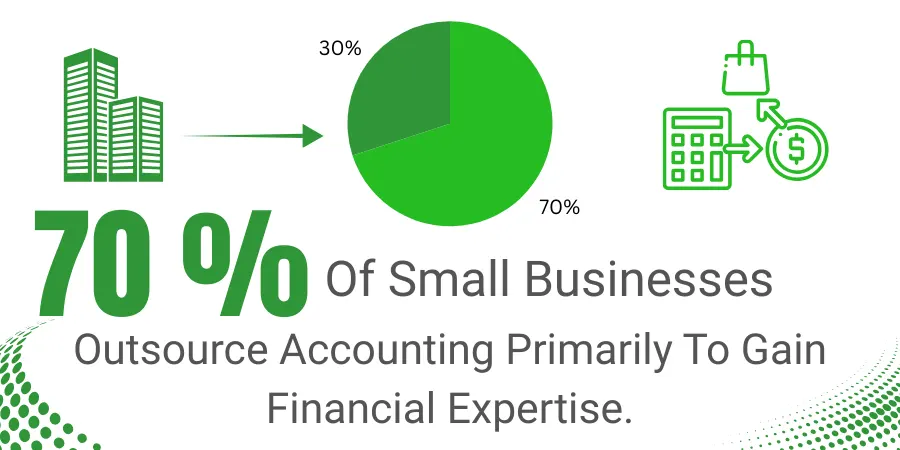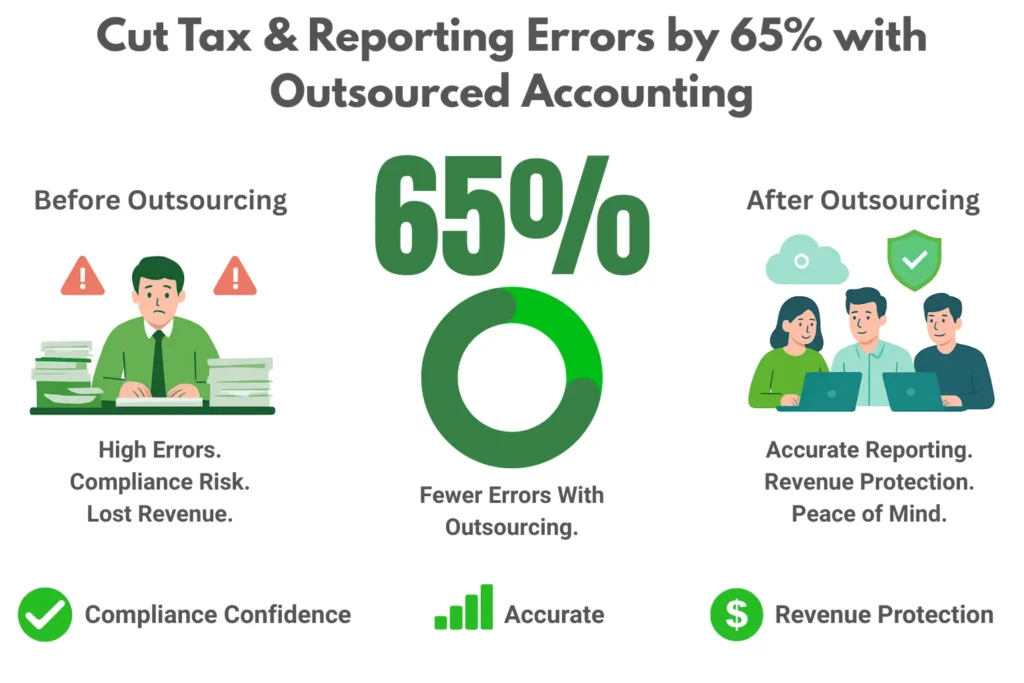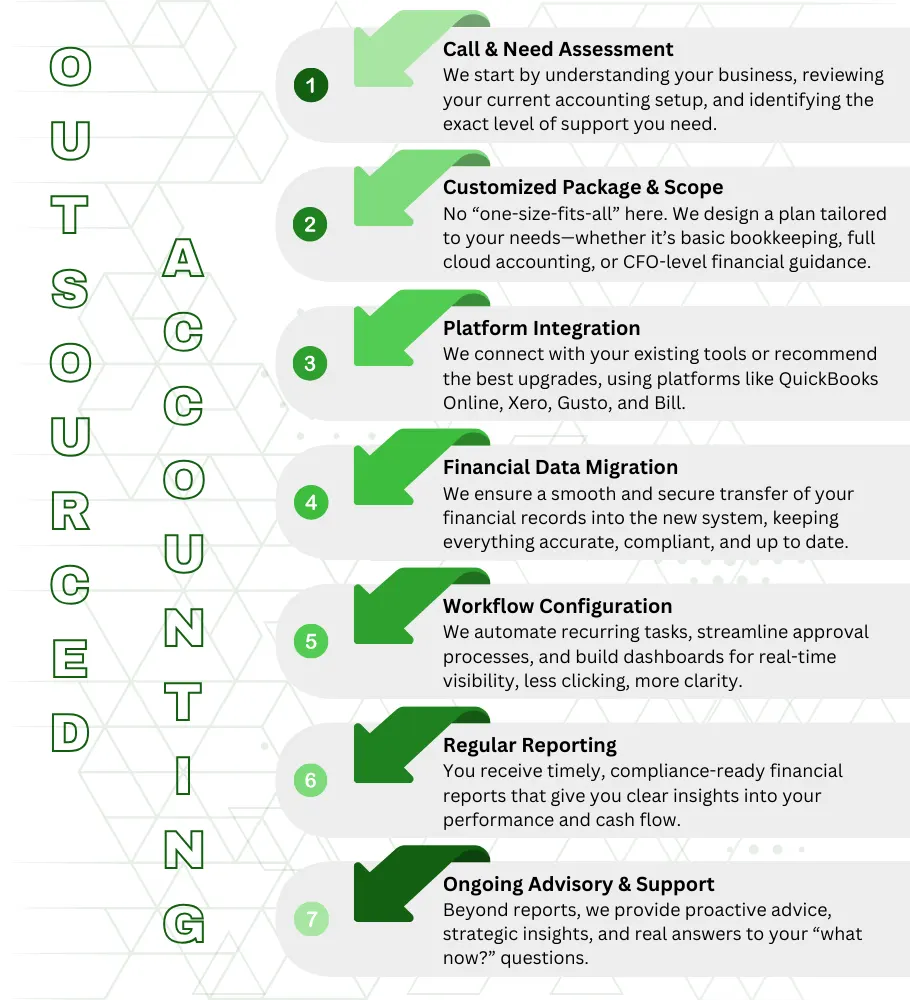
Running an expanding business in 2026 isn’t easy. It is like juggling a set of swords covered with flames and riding a unicycle on a tight rope. Inflation is driving up costs, competition is everywhere, and building an in-house team for every function? Not always realistic! 🥺
A 2026 report from the Global Team shows that around 54% of small businesses are expected to outsource a core function like accounting, not just to save money, but to gain access to real financial expertise.
Therefore, when your finances look like a YouTube DIY project gone wrong 😭, it might be time to outsource to professionals who understand the difference between GAAP (Generally Accepted Accounting Principles) standards and guesswork.
Well, what is Outsourced Accounting?
Outsourced Accounting is exactly what it sounds like: giving your financial tasks or operations to an external firm or team. These include bookkeeping, reporting, payroll, tax preparation, and even CFO level advice.But it’s not just about saving time; it’s about gaining access to a full accounting team that scales with your business. These professionals keep your financial engine running so that you can concentrate more on building your company, not on overseeing balance sheets.
Benefits Of Outsourcing Accounting Services
Here, we have broken down the 10 biggest benefits of outsourcing accounting services for growing businesses like yours.
- Cost Savings
- Time Savings and Speed
- Access to Financial Expertise
- Flexibility & Scalability
- Improved Accuracy & Compliance
- Strategic Decision Support
- Access to Modern Accounting Tech
- Budgeting and Forecasting Insights
- Stronger Cash Flow Management
- Business Focus & Growth
1. Cost Savings
In 2026, with inflation rising and talent costs soaring, cost efficiency is no longer optional; it’s essential. Anin-house, full-time accounting team is an excellent idea, right up until you look at the payroll figures. Employee compensation, medical insurance, enterprise license, and workspace all stack up quicker than your too-long-overdue bills.
That’s where one of the most significant advantages of outsourcing accounting comes in, which is cost savings. According to the Deloitte Global Outsourcing Survey in 2023, Businesses save 30–40% by outsourcing compared to hiring full-time in-house staff. That’s not a minor cut, it’s a significant reduction in your operational burn rate, and no, it is not a typo. It is a savings that you can divert into growth, marketing, or even pay to fix that creaking office door. 😂
2. Time Savings and Speed
If there’s one thing growth-focused companies never have enough of, it’s “time“. Time is money, but in a growing business, time is everything. Your calendar is already full of client calls, team meetings, and the occasional existential crisis. Considering these tasks, how will you manage your finances, manual bookkeeping, invoice follow-ups, and month-end reconciliations? Which can swallow dozens of hours each month. 😨
Well, you don’t have to worry anymore because the solution is simple: outsource your bookkeeping and financial accounting tasks to professionals.
According to the Xero Efficiency Benchmarking Report (2024):
“Businesses using modern outsourced accounting save up to 50% of the time typically spent on bookkeeping and reconciliation.”
That’s not just a few hours, it’s entire workdays recovered. The time difference associated with outsourced accounting is indeed not just noticeable; it is a game-changer.
The shorter you work on numbers = The more improved productivity
Your time is better spent on strategy, customer acquisition, or product improvements.
Why Outsourcing Accelerates Productivity
- Outsourced teams work across time zones → faster turnaround.
- Cloud-based collaboration tools → real-time data sync.
- Automated reconciliations, invoices, and reminders → no more delays.
- Dedicated specialists per function → no task-switching or backlog.

3. Access to Financial Expertise
For many small and mid-sized businesses, hiring a full-time CFO, controller, or CPA-certified accountant is simply out of reach. The reality is that most companies cannot afford them at all. Yet, financial oversight at this level is critical for accurate reporting, tax compliance, and long-term strategy.
The good news is that with outsourced accounting, you don’t need to employ individuals; you can access them all in one place. From a professional financial controller to a bookkeeping expert, you can have all the employees you need. The best part is that you don’t have to hire them; you only have to pay for the services you need.
According to the Fundera/NetSuite Report, outsourcing provides access to expertise that is not affordable in-house for 70% of small businesses. This means outsourced accounting teams can provide a higher caliber of knowledge, without the six-figure salary. This includes control level monitoring, high-level forecasting, tax planning, and the backing of Certified Public Accountants (CPAs), all without the burden of payroll.
Why This Matters For Growing Businesses
- CPA-certified oversight ensures compliance with evolving tax and reporting standards.
- Controller-level expertise helps with cash flow forecasting, budgeting, and financial planning.
- Specialized knowledge in industry-specific accounting (e.g., healthcare, eCommerce, construction).
- Scalable advisory services allow you to tap into expertise only when you need it.
By choosing outsourcing, companies gain both strategic guidance and day-to-day accuracy. Put briefly, they provide you with a complete finance bench to play both offense and defense. Something most startups and SMEs cannot achieve internally. That is a win-win in any economy.
4. Flexibility & Scalability
One of the greatest strengths of outsourcing is the ability to scale services up or down based on business needs. The only thing that stands out about fast-growing businesses is that nothing remains stagnant.
One month, you spend your weekends working on your garage to handle sales and inventory. Three months down the line, you have nationwide shipping, new employees, and you are wondering how your accounting system will cope with another new product launch. This is where scalable fractional finance solutions emerge as a complete game changer, growing alongside your business without the fixed costs of in-house staff.
Take Lina, for example. She is the founder of a direct-to-consumer skincare company who started with just a dream and a Shopify store. With the assistance of fractional accounting services, she expanded her business to $1.5M in revenue in under a year, all without an in-house finance person. Her secret? Flexible financing that was adaptive to the development in real time.
Why Scalability Matters
- Add or reduce accounting hours as your business changes.
- Access fractional CFO and controller services during growth phases.
- Avoid the high fixed salaries of full-time hires.
- Stay lean while ensuring professional oversight at every stage.

5. Improved Accuracy & Compliance
“Uh, we may have overlooked something.” 😩
This is the last thing any business owner wants to hear their accountant say. When businesses keep accounting entirely in-house, they often face hidden regulatory risks, ranging from missed tax deadlines to inaccurate filings. These errors can lead to penalties, audits, losing access to funding, and severely damaged credibility.
That is where outsourcing accounting services comes into force. By outsourcing, companies gain access to professionals who specialize in compliance, financial reporting, and accuracy. These experts keep pace with ever-changing tax laws, reporting standards, and industry regulations, reducing the risk of costly mistakes.
Data given in the Intuit Accountants 2024 Trends Report reveals that partnering with outsourced teams reduces tax or reporting errors up to 65%. Not only does this make them feel good, but it also protects their revenue.
Why It Matters
- Ensure GAAP/IFRS standards are followed consistently.
- Reduce audit risks and avoid costly penalties.
- Gain accurate, timely reports for stakeholders.
- Establish a reliable compliance framework that scales with growth.
The result? With professional financial reporting and expert oversight, outsourced teams provide a safeguard against regulatory pitfalls, helping businesses stay confident, compliant, and future-ready. They delivered with cleanliness, timeliness, and scalability, and built-in compliance & accuracy into every ledger.
6. Strategic Decision Support
Accounting is not just about the quarter just passed; it is also about predicting what is ahead and planning to handle it all. It empowers leadership with advisory insights and forward-looking forecasting that drive growth.
And guess what? It begins with cleverer, keener figures where strategic decision-making is applied.
Accounting outsourcing firms do not balance your books and disappear into the bottomless pit of spreadsheets. The most effective ones offer strategic tips that help you gain a deeper understanding of your business. Instead of just delivering numbers, outsourced finance teams interpret data to support strategic decision-making.
With access to dashboards and real-time KPI tracking, businesses gain visibility into:
- Profitability by product line
- Cash flow forecasts
- Budget vs. actual performance
- Break-even analysis and growth scenarios
Imagine seeing a live financial KPI dashboard that shows sales trends, profit margins, revenue estimations, and cash flow forecasts at a glance, turning raw numbers into actionable insights. This proactive approach helps executives make smarter, faster decisions, whether it’s entering a new market, raising capital, or adjusting pricing strategies. Outsourced advisors essentially become your strategic partners, providing guidance that in-house staff alone often cannot.
7. Access to Modern Accounting Tech
Do you still use Excel for everything?
We won’t judge, but your accountant will! 😂
The best-kept secret of the outsourcing industry is that you not only receive the welcome relief of monetary obligations, but also get access to the most innovative cloud accounting software and accounting automation devices. That would not be accessible to most without paying a fortune and months of training. We are referring to tech stacks with systems such as QuickBooks Online, Xero, NetSuite, Syft, and Gusto, which are combined, automated, and personalized to fit your businesses.
📊 Did you know?
In a 2024 TechRepublic Survey, 60% providers of outsourced accounting services rely on automation to reduce turnaround times by half, ensuring clients receive faster, more accurate results.
These tools improve:
- Real-time financial visibility with dashboards and analytics
- Document management and secure cloud storage
- Workflow automation for payables, receivables, and reconciliations
- Scalable solutions that grow as your business does
These platforms enable your company to transcend mere book digitization, providing you with the tools to view everything instantly and forecast future cash flows for your business. By handling repetitive tasks with automation (such as invoice matching or payroll runs), you save time and eliminate human error simultaneously.
8. Budgeting and Forecasting Insights
Making decisions about your next step purely by guessing your financial situation is comparable to driving a car. At the same time, your eyes are taped up half shut, a risky game which is not likely to end well. This is why such features of budgeting and forecasting are needed, especially when it comes to businesses pursuing high-growth objectives. With outsourced accounting, you gain access to budgeting, forecasting, and financial KPI tracking, critical tools for long-term stability.
A CFO Dive Study (2023) found that businesses with outsourced financial controllers improved cash flow forecasting by 43%, helping leaders make smarter, data-driven decisions.
Outsourced experts provide:
With outsourced teams, it is much easier to plan your expenses around revenue targets, which are much easier to see early on, so that any decision made is proactive rather than reactive.
- Accurate budget models aligned with business goals
- Rolling forecasts that adapt to changing market conditions
- Financial KPIs and dashboards to monitor performance in real time
- Scenario planning to prepare for funding, expansion, or downturns
Forecasts help you to know where to expect a slump or even know where to put extra forces to ensure that you will be able to meet the demands the organization hears (or knows) will take place. Real-time dashboards that allow easy understanding of all your financial KPIs and help make them much more actionable. That is an immense victory for any team whose goal is to scale at a sustainable level.
9. Stronger Cash Flow Management
Ever checked your bank balance and wondered why it’s low, even though your receivables make it look like we are rich and doing great! 🤫
That’s a classic case of cash mismanagement, where invoices pile up, payments get delayed, and no one really knows when money will actually hit the account.
The good news is that this problem is mitigated by outsourcing. With an expert accounting team managing accounts payable and accounts receivable processes, cash flow becomes predictable, bills are paid on time, and you stay focused on growing the business instead of stressing over where the money went.
💳 According to Sage Global Research, companies that work with outsourced accounting firms reduce Days Sales Outstanding (DSO) by up to 30%, meaning cash lands in the bank faster and with fewer delays.
Practical benefits include:
- Faster invoice generation and collections.
- Proactive follow-ups to reduce late payments.
- Smarter vendor payment scheduling for better liquidity.
- Clear visibility into incoming and outgoing cash.
By outsourcing, businesses gain access to streamlined accounts receivable processes and optimized accounts payable workflows that keep money moving on time.
The result? More reliable cash flow, less stress over payroll or expenses, and a stronger foundation for growth.
10. Business Focus & Growth
You didn’t build your business to spend afternoons buried in receipts or stressing over tax rules. You built it to innovate, grow, and beat the competition. Outsourcing your accounting clears both your calendar and your headspace, so you can focus on running the show. No more late nights wrestling with bank feeds or Googling QuickBooks errors at 2 a.m, just more time for strategy, growth, and maybe even a good night’s sleep.
📊 According to the Clutch Business Efficiency Report (2024), companies supported by outsourced finance teams grow 2x faster than those managing everything in-house.
Why do companies grow 2x faster?
Because when teams aren’t stuck in spreadsheets, they can focus on strategy, sales, product development, and customer experience. Outsourcing isn’t about losing control; it’s about giving the right tasks to the right experts so you stay in control of what matters most.
How did New SAAS startups in 2024 scale quickly?
Because instead of hiring full-time staff, they turned to outsourced accounting services customized for startups, which gave them lean, flexible support that matched their growth pace without slowing innovation.
In fact, trends show this is becoming a smart move fast. According to Insignia Resources’ report, about 37% of U.S. businesses plan to outsource accounting by the end of 2026, aiming for 20–60% in cost savings and smoother access to skilled finance support. For fast-growing startups, this kind of adaptive support keeps pace with ambition without slowing anything down.
Still Confused About Which Accounting Solution Fits You Best?
Not sure whether you need an outsourced accounting firm or an in-house accounting team?
We explain the difference in detail so you can choose what’s right for you.
Here’s How to Compare Your Options:
| Factor | In-House Accounting | Outsourced Accounting |
| Cost | High (salaries, benefits, office space) | 30–40% cost savings; pay per service or monthly retainer |
| Scalability | Limited to team size and hiring budget | Easily scalable as business grows |
| Expertise | Dependent on one or two hires | Access to a full accounting team (bookkeepers, controllers, CFOs). |
| Technology Stack | May rely on legacy systems | Uses latest cloud accounting, automation, AI tools. |
| Time to Hire/Onboard | Several weeks to months | Fast onboarding (in days or weeks) |
| Risk of Turnover | High; knowledge leaves with employee | Low; firm retains process continuity |
| Compliance & Accuracy | Varies by hire’s experience | Dedicated compliance and quality checks |
| Focus on Core Business | Distraction from core operations | Frees up founders/execs to focus on growth |
Outsourced Bookkeeping vs. Full Outsourced Accounting
People often get confused between Bookkeeping and Accounting. So, here we made a comparison between outsourced bookkeeping vs full accounting, to help those of you who want to clear this confusion as well. We have covered that list in detail so that you can make the right decision and save money.
| Service Level | Outsourced Bookkeeping | Full Outsourced Accounting |
| Scope of Work | Basic: recording transactions, bank reconciliations | End-to-end: Bookkeeping + Reporting + Budgeting + Advisory + More |
| Personnel | Bookkeeper only | Team: Bookkeeper + Controller + (optional) CFO + More |
| Reporting | Limited or monthly summarise | Financial reports, cash flow analysis, KPIs |
| Budgeting & Forecasting | Not included | Included in most full-service packages |
| Advisory Support | No strategic advice | Strategic guidance for business growth |
| Cost | Lower; pay for basic services | Higher, but offers complete financial insight |
| Ideal For | Startups with limited transactions | Growing businesses needing CFO-level insight |
Bottom line: Outsourced Accounting will give you flexibility, expertise, and peace of mind, and perhaps even a good night’s sleep during tax season. 😅
Risk Considerations and How to Mitigate Them
At this point, the idea of outsourcing your accounting must be sounding like a dream, but if you wonder, “Well, that sounds great but what are the pitfalls?” then you are not alone. It makes sense to inquire. Any strategic move is accompanied by its risks, and outsourcing is no exception. Nevertheless, when you have a proper system and reliable business partners, these are not show-stoppers; they are entirely feasible.
Common Risks in Outsourced Accounting
- Communication Delays: Misaligned time zones or unclear reporting cycles can slow down processes.
- Data Security Concerns: Transferring sensitive financial information carries risks if not protected properly.
- Scalability Gaps: Some providers may not adjust quickly enough as your business grows.
✅ How to Mitigate These Risks
| Risks | Mitigation Strategy |
| Communication Delays | Define SLAs (Service Level Agreements) for response times and reporting schedules. |
| Data Security Threats | Use advanced encryption protocols, two-factor authentication, and strict access controls |
| Business Disruption | Ensure backup systems and continuity plans are in place. |
| Limited Scalability | Partner with firms offering scalable fractional finance solutions that grow with your company. |
The take-home point?
Each of the accounting models constitutes trade-offs. However, active planning, strict borders, and an adequate tech stack make the advantages of outsourcing much more significant than the risks. By putting these benefits of outsourcing finance and accounting services directly on the table, Outsourced Accountants’ is not only selling services, but we are selling a joint venture, a partnership characterised by trust, transparency and reliability. 😃
How Outsourced Accounting Works in 2026?
If you’re picturing outsourcing your finances as handing spreadsheets to someone offshore and hoping for the best, stop right there!
Outsourced accounting services in 2026 look nothing like that. It’s faster, smarter, and designed to integrate with your business in real time.
Let’s walk you through what actually happens when you hire an outsourced accounting partner.
Discover Call or Need Assessment -> Customize Package and Scope -> Platform Integration -> Financial Data Migration -> Workflow Configuration -> Regular Reporting -> Ongoing Advisory and Support

This process eliminates the overwhelming “where do I even begin?” question. Your dedicated and expert financial controller or account manager sets up the cloud tools, configures reporting dashboards, and ensures your compliance needs are covered from day one.
Cloud Accounting: Work from Anywhere, Anytime
Gusto Small Business Trends Report of 2024 shows that 50% faster financial reporting is achieved with cloud-based accounting software.
Tools like QuickBooks Online, Xero, or NetSuite allow business owners to:
- View their financial health in real time.
- Share access securely with their team or investors.
- Eliminate messy spreadsheets or version conflicts.
You’re no longer tied to an office PC. Now you can check on your cash flow while boarding a flight or approving payroll from your phone.
Automating the Boring Stuff (So You Can Focus on Growth)
Accounting automation handles the heavy lifting behind the scenes:
- Bank Reconciliations run nightly.
- Recurring invoices are issued on schedule.
- Payroll and tax filings are submitted without delay.
- Accounts payable are managed through approval workflows.
This isn’t just about speed, it’s about accuracy and compliance, too. Errors get flagged automatically, audit trails are recorded, and your books are always clean.
Compliance and Accuracy: Built Into the Process
With every transaction, outsourced teams ensure:
- Your business is following the latest IRS and GAAP standards.
- Year-end closeouts are stress-free and prepared for audit.
- Data security is maintained with encrypted backups and two-factor authentication.
You’re not just outsourcing a task; you’re gaining a layer of protection for your finances.
Why Choose Outsourced Accountants?
At Outsourced Accountants, we have structured our services to ensure your finances are in compliance and your wallet is happy. You have all the advantages of professional financial experts without the full-time price. Even better, our cost-effective offshore accounting team can achieve even greater savings for you. Here’s how;
Why You Save So Much:
- No onboarding costs or employee turnover.
- Pay only for the services you need, scale up or down anytime.
- Access to expert tools and automation without separate subscriptions.
- Lower offshore labor costs with the same (or better) quality.
A SAAS Startup Founder’s Review of Outsourced Accountants
“As the founder of a startup, I never got around to learning accounting, so Outsourced Accountants got in there and developed a financial system that grew with us. It took me less than one month to go through spreadsheets to clean dashboards. A game-changer in its entirety.”
Daniel S.
We’ve helped dozens of growth-stage businesses, from bootstrapped startups to Series A eCommerce brands. Our team would be delighted to correct any errors on your bank statement. You will not only save money, but you will also have time to grow your business without any financial fear. We will build a flexible accounting system that helps you scale. From day-to-day bookkeeping to monthly reporting and strategic forecasting, outsourced accounting services give you the financial muscle of a larger company, without the overhead.
Frequently Asked Questions
Q1. What are the top benefits of outsourcing accounting services in 2026?
Outsourcing brings cost savings, access to financial expertise, scalability, improved compliance, and time efficiency. With modern cloud-based tools, businesses also gain real-time financial visibility to make smarter decisions.
Q2. How much money can a small business save by outsourcing accounting?
On average, small businesses save 30–40% compared to in-house accounting teams, according to the Clutch Business Efficiency Report (2024). This comes from reducing salaries, benefits, and overhead costs.
Q3. Is outsourcing accounting safe for data and compliance?
Yes, reputable providers use bank-grade encryption, SOC-2 compliant systems, and regular data backups. With SLAs and compliance checks in place, outsourced teams significantly lower the risk of reporting errors and regulatory breaches.
Q4. How do outsourced accounting services support business growth?
They free up founders to focus on core operations while providing budgeting, forecasting, and strategic decision-making support. Research shows companies with outsourced teams grow up to 2x faster than those managing in-house.
Q5. What’s the difference between outsourced bookkeeping and full accounting?
- Bookkeeping: Recording transactions, reconciliations, and basic reports.
- Full Accounting: End-to-end services including bookkeeping, financial reporting, budgeting, forecasting, and CFO-level strategic insights.
👉 See our comparison above on outsourced bookkeeping vs. full accounting for a detailed breakdown






